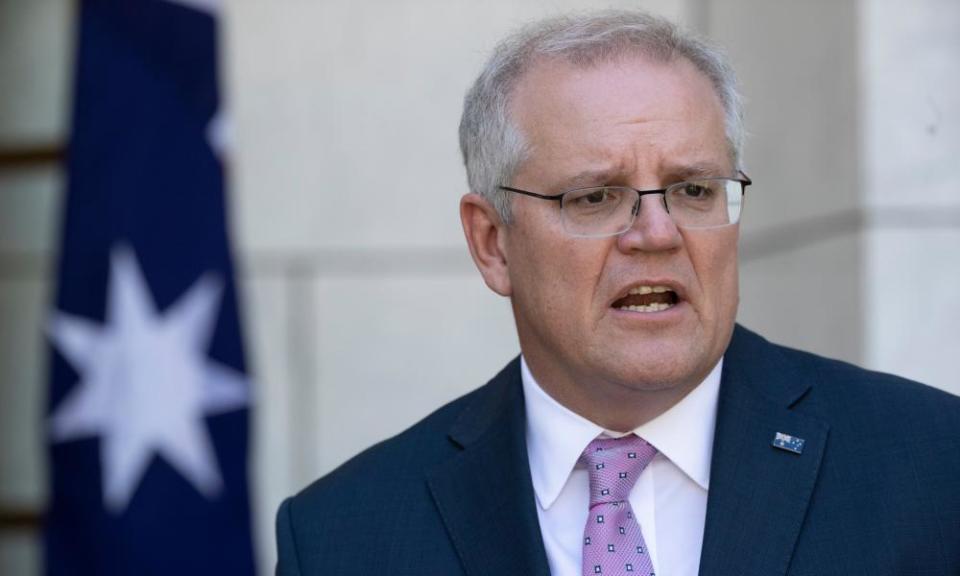One Nation backflip sinks safeguards to prevent older workers being sacked under jobmaker

One Nation has backflipped on youth wage subsidies, teaming up with the Coalition to reject safeguards that would have prevented existing workers being sacked or losing hours to make way for new hires aged 35 and under.
In a rare display of unity on Tuesday, Labor, the Greens, One Nation and senators Rex Patrick and Jacqui Lambie voted to add the safeguard to the government’s jobmaker hiring credits bill, which will grant subsidies of up to $200 a week for younger workers.
The Coalition on Wednesday morning rejected the amendment in the House of Representatives setting up a standoff with Labor and the Senate.
The One Nation leader, Pauline Hanson, had warned on Tuesday that jobmaker left older jobseekers “overlooked and disadvantaged” and “would encourage the loss of full-time jobs and reduce job security”.
Related: 'Another kick in the guts': further Covid welfare cut worries struggling Australians
But when the government asked the Senate to drop the amendment on Wednesday evening, One Nation reversed its position and voted with the Coalition, delivering the government a 30 to 28 votes win.
Hanson said she had been persuaded by the treasurer, Josh Frydenberg, that due to protections in the Fair Work Act employers “can’t just go and sack people ... it can be challenged”.
The One Nation senator Malcolm Roberts said the minor party had been persuaded by the fact youth unemployment stood at 10.4% compared with unemployment of 4% for those aged over 35.
Both Roberts and the government leader in the Senate, Simon Birmingham, denied a deal had been done. Rather, Roberts said he and Hanson had “the courage and integrity to change our minds”. “We were wrong on the amendments – we stand corrected.”
Labor’s employment spokesman, Brendan O’Connor, said introducing a “loophole” in the legislation by eliminating the safeguard would allow “rogue employers to displace or sack workers”.
“Not only is this grossly unfair, but it will fail to deliver net additional jobs that the government has promised,” he said. “The scheme is called jobmaker. Right now, it looks more like jobtaker.”
Earlier, in question time, Labor used every question to probe jobmaker, including the exclusion of workers over 35, lack of safeguards, and discriminatory job ads seeking younger workers.
In response, Scott Morrison doubled down on incorrect claims he made in October that employers could not sack existing staff and receive the subsidy.
Morrison cited safeguards in the rules that require employers to increase their headcount and payroll to access jobmaker hiring credits, and counter-punched by accusing Labor of “seeking to create fear in a pandemic”.
Earlier, before the lower house vote, the Labor leader, Anthony Albanese, said it was “totally unacceptable” that the unamended bill would provide a financial incentive for employers to sack existing staff.
Albanese said if the government was “fair dinkum” about creating additional jobs, it had to vote for the safeguard.
“The fact is Labor will not tolerate a circumstance where those aged over 35 get done over as a result of legislation passed by this parliament.”
The Greens leader, Adam Bandt, said the safeguard does no more than legislate what the prime minister believes is the status quo, “that you can’t sack someone or reduce their hours of work to get this credit”.
Bandt rejected Morrison’s view by noting the scheme allows employers to “to pick up and put on two people on minimum wage at low hours of work” to replace one full-time worker.
The government claims that as well as the new headcount requirements, existing protections against unfair dismissal and adverse action in the Fair Work Act would prevent workers losing their jobs or hours.
The attorney general, Christian Porter, said that “all the usual protections apply” and sacking a worker to hire another on wage subsidies “would never be a valid reason” in law.
Related: More jobs for Australian teenagers is good news for them but not recovery | Greg Jericho
At the Senate inquiry, the Australian Council of Trade Unions president, Michele O’Neil, warned that casuals lack the protection of unfair dismissal laws, while adverse action laws had been “read down” to the point they were unusable.
Payments for the subsidy scheme will not be made until February and the government is consulting on the scheme’s rules until 27 November.
Labor argued there was time to consider safeguards without delaying payments.
But Frydenberg said in question time that Labor’s position was “delaying certainty” for business. He argued the credit was needed because in the last recession, youth unemployment took 15 years to return to pre-recession levels.
Birmingham noted in Senate debate that jobmaker credits are backdated to the budget on 7 October, saying it was a “shame on Labor” that they had created uncertainty over the rules while employers were considering new hires.

 Yahoo Finance
Yahoo Finance 